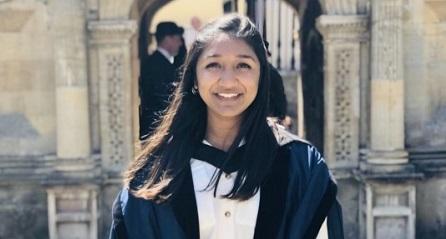Each year, the IMechE Healthcare Technologies Student and Early Career Awards offer researchers an opportunity to showcase their work to business and academics leaders in the wide field of bioengineering.
Shreya is a medical student currently in her 5th year of Medicine. She completed the prize winning project while studying for a Master’s in Engineering, which she did in between her medical studies. She has a keen interest in continuing her involvement in bioengineering for medical applications, and has subsequently worked on a number of joint projects between the Department of Engineering and the Department of Medicine.
Shreya explains her project:
"The objective of the project was to develop an ‘artificial cochlea’ platform with which to test cochlear implants (CIs). CIs are electronic devices used to provide a sense of sound to a person who is profoundly deaf by stimulating the auditory nerve. CI users often experience difficulty with music and speech perception in noise because of the limited spatial resolution of CIs and high conductivity of fluid in the ear; therefore, optimising the spread of electrical stimulation at the electrode-auditory nerve interface is a key area of CI research. However, current research is predominantly obtained using electronic feedback from the CIs, computational modelling or psychometric studies from CI users, which means research is dependent on cadaveric specimens or surgically implanted CI users, and does not experimentally demonstrate what auditory nerves actually see. Therefore, the project aims were to develop an artificial cochlea which anatomically and electrically mimics the human cochlea.
"The novel artificial cochlea model and data obtained provided novel insight into different stimulated modes delivered by cochlear implants. With these results, we can begin to provide truly results-driven recommendations to cochlear implant companies for optimal stimulation modes. Following this project, the device is being extended to more accurately reflect the anatomical and electrical human cochlea using denser electrode arrays and bioengineered materials."
The research was published recently in the journal IEEE Transactions in Biomedical Engineering. It is available as an Open Access article and will shortly be published in an upcoming issue of the journal.
Shreya says: "I feel honoured to have been able to work with both Professors George Malliaras and Manohar Bance on this project, both highly esteemed in their respective fields, and their research groups have been fantastic at giving me support and guidance with this project. A particular thank you to Chen Jiang for his assistance with the project and as co-author of the published paper. The project in cochlear implants has given me the opportunity to work at the intersection between engineering and medicine, and I am excited to continue further work in these fields."
Shreya is founder and co-host of the podcast series 'CUTalks by CUTEC', a podcast about tech entrepreneurship for aspiring innovators, with guests including eminent founders, investors and experts. Shreya has a passion for biotech and digital innovation in healthcare.
Reproduced courtesy of University of Cambridge, Department of Engineering
